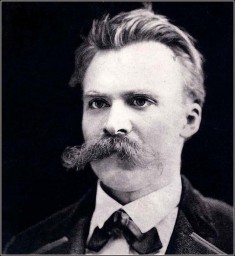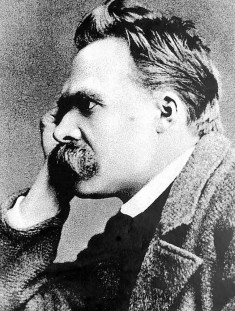| Friedrich Nietzsche | |
|---|---|
 |
|
| Philosopher | |
| Specialty | Western tradition |
| Born | Oct. 15, 1844 Röcken-bei-Lützen, Kingdom of Prussia |
| Died | August 25, 1900 (at age 55) Weimar, Saxony, German Empire |
| Nationality | German |
Friedrich Nietzsche is commonly thought of in terms of a misanthrope who seemingly saw nothing of value in humanity. Assessments of this nature are rather narrow and do not truly look at the full scope and breadth of his intellectual theories, which provided a significant basis for the overall existentialism movement.
Nietzsche’s Early Years
Friedrich Nietzsche was born on October 15, 1844, in Röcken, Germany. He grew up in humble beginnings and was a decent student in school. When he started to show promise in music, his studies began to focus in that area. He also began to study subjects that were deemed counter-cultural at the time, such as the works of the poet Friedrich Hölderlin.
As he matured, Nietzsche attended the University of Bonn. Ironically, one of his areas of study was theology, but he was growing increasingly critical of religion. His essay, Fate and History, greatly criticized the teachings of Christianity. Nietzsche began to cease his study of theology and lost all faith in religion. He started to concentrate mostly on philology, which is the study of how languages develop.
Nietzsche’s Changing Views
Two works that Nietzsche read that had a pronounced influence on his own thinking were History of Materialism by Friedrich Albert Lange and The World as Will and Representation by Schopenhauer. These works had a slight cynical edge to them, which would not be lost on Nietzsche nor on his style of thinking and writing.
Nietzsche began to look at Europe’s obsession with science and materialism and begin to slowly craft his own point of view about them. He sought to call attention to the human condition and how the human mind worked. His primary occupation became that of a Professor at Basel and, when he left, he collected a pension from the university.
Of course, during this 21-year period, he wrote and published a great deal of his philosophy. Without these works, the entire movement of existentialism, a movement based on the search for human meaning in a troubled world, would be lacking a great deal in its intellectual underpinnings.
Works and Philosophy
 Nietzsche did not hold back his opinions regarding what he felt were systemic problems in the world. However, his works did try to show another way forward. The material he wrote about frequently focused on improving the culture and also aiding those willing to improve themselves to see vehicles in which to do so. His sentiments were rooted in seeing things as they truly are and such honest assessments are often confused with cynicism.
Nietzsche did not hold back his opinions regarding what he felt were systemic problems in the world. However, his works did try to show another way forward. The material he wrote about frequently focused on improving the culture and also aiding those willing to improve themselves to see vehicles in which to do so. His sentiments were rooted in seeing things as they truly are and such honest assessments are often confused with cynicism.
Nietzsche was also someone who sought to question those in power. Whether the subject of his querying was the classical arts or the world of religion, Nietzsche was willing to sharply criticize what he saw as flawed or hypocritical. This approach did not exactly endear him to those who benefit from the status quo.
One of the more troubling aspects of his writings was that he did not believe in systems. Hence, a lot of his writings are somewhat confusing and lacking in order. His major works are certainly interesting and widely read. The works continue to influence modern thought across all spectrums and cultures.
Nietzsche’s Major Philosophical Works
The major works of Nietzsche include The Birth of Tragedy (1872), Human, All Too Human (1878), Beyond Good and Evil (1886), and On the Genealogy of Morals (1887), among others. The themes of these works were unique. For instance, The Birth of Tragedy centered on topics related to drama and noted how art can aid in escaping the mundane nihilism of the real world. Beyond Good and Evil looks at the dogmatic attitudes of past philosophers and also offered critical insights into how morals emerge.
Death and Legacy
Friedrich Nietzsche died under very mysterious circumstances. On January 3, 1889, he suffered a major mental collapse on the streets of Turin. Nietzsche was hospitalized as his behavior became even more strange and erratic.
He eventually traveled to Wiemar, Germany where he continued to write amidst declining health. Eventually, it was revealed he was suffering from tertiary syphilis. After suffering two strokes and contracting pneumonia, Nietzsche passed away on August 25, 1900.